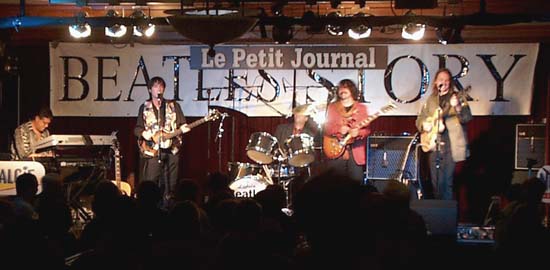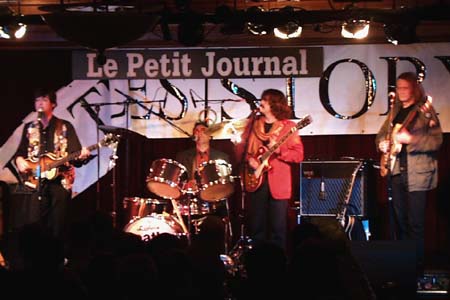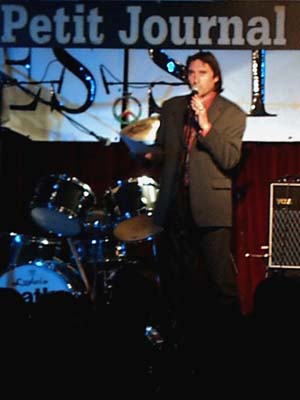Topic: World View
World Politics: Just More of the Realists versus the Idealists
Last Sunday in these pages - in Germany: The Upcoming Elections - Ric Erickson, editor of MetropoleParis, and Just Above Sunset discussed the situation over there, and the election that day. After you worked through matters regarding the Pamela Anderson photos in the museum in Munich, in the Haus der Kunst, and some comments on the sweet young German girls sunbathing completely in the nude in the middle of the city, matters came down to the implications of the contest between Gerhard Schröder and the American-style conservative Angela Merkel. Who would be the next German chancellor? Would it be Gerhard, or "this Merkel dame," as Ric called her.
There was some interest in that on this side of the Atlantic. As mentioned then, American conservatives need a Teutonic Margaret Thatcher person to prove that what they claim about how the world should be run is right - a sort of anti-Chirac, someone who will get Germany revving up economically to prove their point about cutting taxes for the rich and services to the poor and going to war without any direct threat for abstract reasons. A hero would be nice - or a heroine in this case. They miss Reagan's ballsy British sister in unfettered low-tax screw-the-needy capitalism and elective war (remember Grenada and the Falkland Islands wars?) - so "this Merkel dame" is the darling of the guys who run the United States now. What with the hurricane embarrassment and the nearly three hundred dead in the streets of Baghdad that week, her winning this thing would have raised their spirits.
But it wasn't to be. Neither Schröder nor Merkel won enough votes to form a new government, and both are trying to form coalitions with the outliers, so to speak, to take control, while trading insults with each other. It's quite a mess. Here in Los Angeles BBC-America on its World News show has run man-in-the-street segments from Germany with various ordinary folks saying they fear this mess will mean months and months of trouble. And over at the preferred web site of the American right, "Red State," you get things like Reagan/Thatcher Revolution Once Again Fails to Penetrate Mainland Europe: "It's a shame that the good people of Europe can't seem to get their heads around the fact that high payroll taxes to pay for social programs mean less [sic] jobs. As labor markets become increasingly fluid, these types of policies pushed by the left only hurt. We know that here, but they can't seem to figure it out in Mainland Europe."
Oh well.
But trying to figure out what happened we have William Pfaff, on Friday, 23 September in the International Herald Tribune, with Europeans Thumb Their Noses at the Experts.
Pfaff recounts a mid-July trip when Angela Merkel visited Paris to make a courtesy call on President Jacques Chirac but really to attend a press event organized by Nicolas Sarkozy, who one can see at her French counterpart (the New Yorker has called him "the fake American").
Note this:
Pfaff suggests someone should have told them both not to stage this we're-taking-over kind of rally so many months before the election. Saying you represent the wave of the future before the election can be dangerous, even if that is the Bush-Rove way of doing such things. Yes, there was "a crush of conservative Washington think-tank celebrations of old Europe's imminent return to the path of righteousness." But it wasn't to be. Chirac got sick and Dominique de Villepin went to New York for the UN reform conference, while Nicolas Sarkozy had to stay home and pout. And Angela Merkel couldn't pull of a clear win - she has a three-seat parliamentary advantage that isn't enough to matter. She won't end the welfare state nor toss out taxes on wealth and income replacing them with a flat tax of twenty-five percent on everyone, including the poorest of the poor, nor deregulate the economy so corporations can do whatever they want and make things better for everyone.The allure of the shared press conference was that European, and especially British and American, press and politicians were fascinated by the notion that Merkel and Sarkozy would both win their elections and join Prime Minister Tony Blair of Britain in a new European triumvirate of free-market economies and pro-American governments.
The two were "the new face of Europe," Berlin's Die Tageszeitung wrote at the time. "Since the fiasco of the referendums on the European constitution, there has been a total reversal ... of the old Chirac- Schröder European policy." The rising fortunes of Germany's Christian Democrat-Christian Social alliance announced the impending end of the "Paris-Berlin-Moscow axis," and the return of Berlin to the Atlanticist fold.
She said in July this would happen. Like her neoconservative soul mates in Washington, she was making her own reality by saying it would be so, because she believed it would be so. The reality she now must face is the voters said no, maybe no so fast with all this stuff. And if she manages to form some so of coalition to become chancellor she has to deal with folks who don't agree with her. Stalemate. No major economic reforms.
Reality is like that. She should ask George Bush about such things. He's been bumping up against it lately.
Pfaff, in Europe, says most commentary on the right there, and here too actually, "has expressed exasperated annoyance that the electorate isn't doing what its betters expect of it." It's all in this vein: "Don't the German voters understand that they must undergo structural reform, job losses, benefit reductions and pension restrictions? They don't seem to. They vote against them. They are being slack and selfish. It is very annoying."
Yeah, but it's the reality. And he says what happened is similar to what happened when French and Dutch voters rejected the European constitutional treaty earlier this year. The voters said no, and the experts said they were uninformed and needed reeducated. They didn't see "the Truth."
But Pfaff suggests they did:
Geez, everyone these days wants answers! Where's FEMA? Where are those WMD and the ties to al Qaeda? If the economy is in great shape, why has poverty here risen steadily for four years, why are more and more folks are without any health insurance (up from forth-two million to forty-five million), and, by the way, where are the good jobs, or any jobs? And if we're winning this war in Iraq, why are so may people dying and why does it look like a civil war there now, and clearly leading to the creation of a client state of Iran there? Picky, picky, picky?Consider the matter from the point of view of the voter. Ever since the new monetarist economic paradigm emerged from the alchemical laboratories of the University of Chicago, carrying all before it in the business schools of America, economists and chief executives worldwide have assured the public that the truth about economic success has at last been found.
This truth is that old notions of social justice in the workplace, and corporate responsibility to the community, are actually inefficiencies that present obstacles to the pursuit of corporate performance as measured by profits and stock market results.
According to this paradigm, maximum corporate profit produces maximized happiness for all (with certain unavoidable time discrepancies). Combined with deregulation and globalization, it can be relied on to make a better world.
The voter has said, "Yes, that must be so, if you say so." So workers have lost jobs, or had wages fall behind rising living costs, their employment benefits cut (and in the United States, health insurance coverage slashed and pension funds looted by management), all so that new and better jobs would eventually be created, new prosperity generated, and happier and more secure lives assured.
What has happened now, it seems, in Germany and in France, is that voters have concluded that for more than 30 years they have accepted the sacrifices, but where are the rewards? They want to know.
Folks really are hung up on reality. What a shame.
Well, it's just more of the realists versus the idealists. The realists have the upper hand at the moment.
Personal Note: In the late sixties I took an elective course in undergraduate school, in macroeconomics of all things, from one of these University of Chicago guys, a fellow who had studied under Milton Freidman. (He reminded us of that two or three times a week.) I don't recall his name, although I recall the grand unifying theories involved - ah, those "alchemical laboratories of the University of Chicago." None of us were impressed as I recall, but probably because the course was one of those early morning things and he'd always show up needing a shave, his dirty hair sticking out this way and that, his shirttails out, with a massive hangover - and with his mean little dachshund tucked under one arm. The dog growled at us all. This no doubt has colored my view of supply-side economics and money-supply theories of economic growth. Didn't like that dog.
__
Additional Notes on European Matters:
One of Ric Erickson's columns in last weekend's Just Above Sunset - French Confusion - untangled French national politics for our readers - Nicolas Sarkozy, de Villepin and all the others vying for power there, from the left to the right with some in the middle. It's a bit fluid and was updated on Tuesday with more detail from Ric, adding two more players.
Here it is Thursday and Ric adds this:
Even California politics isn't THIS complicated!Readers may have thought the list of real and potential candidates for president of France in 2007 was Gallic satire. But not at all. It is exciting reality.
In fact this list may have been carefully studied by the Elysée, Matignon, the Place Beauvau, and PS headquarters. Today François Hollande, secretary general of the Socialist Party, said, "This is not the moment to announce being a candidate."
This was in response - not apparently to Just Above Sunset or Metropole - but to an article in Paris Match in which Ségolène Royal, president of the regional council of Poitou-Charentes, refused to deny having the idea of being a presidential candidate in 2007. Ms Royal was a minister in the last Jospin government, and is the long-time and current 'companion' of François Hollande.
He went on to say, repeating it tonight on the political question-and-answer period following the TV-news on France-2 TV, that candidates should wait until 'the end of 2006' before declaring. Another member of the PS, interviewed on TV, wondered how many PS candidates there are now. "I guess there must be 18," he said.
Recently on the outs, ex-prime minister Laurent Fabius, was on France-3 TV-news tonight, making a few kind remarks about the Socialist Party. Over the past week the PS leader of the 'non' vote for the European constitution has been moving closer to former comrades, or at least has been seen in the same room with Monsieur Hollande.
To come - possible confirmation of the sentence handed out to UMP leader Alain Juppé, amounting to a 10-year ban from politics. Also, José Bové was in court, facing a heavy fine and possible jail time for destroying some trans-genetic corn. A co-defendent is a leader of the Greens - motto: Allez Les Verts! - and the first mayor in France to marry a homosexual pair; also a potential presidential candidate.
If France is trying for a record number of presidential candidates, it may already be a world leader.
Posted by Alan at 18:48 PDT
|
Post Comment |
Permalink
Updated: Thursday, 22 September 2005 18:54 PDT
home






